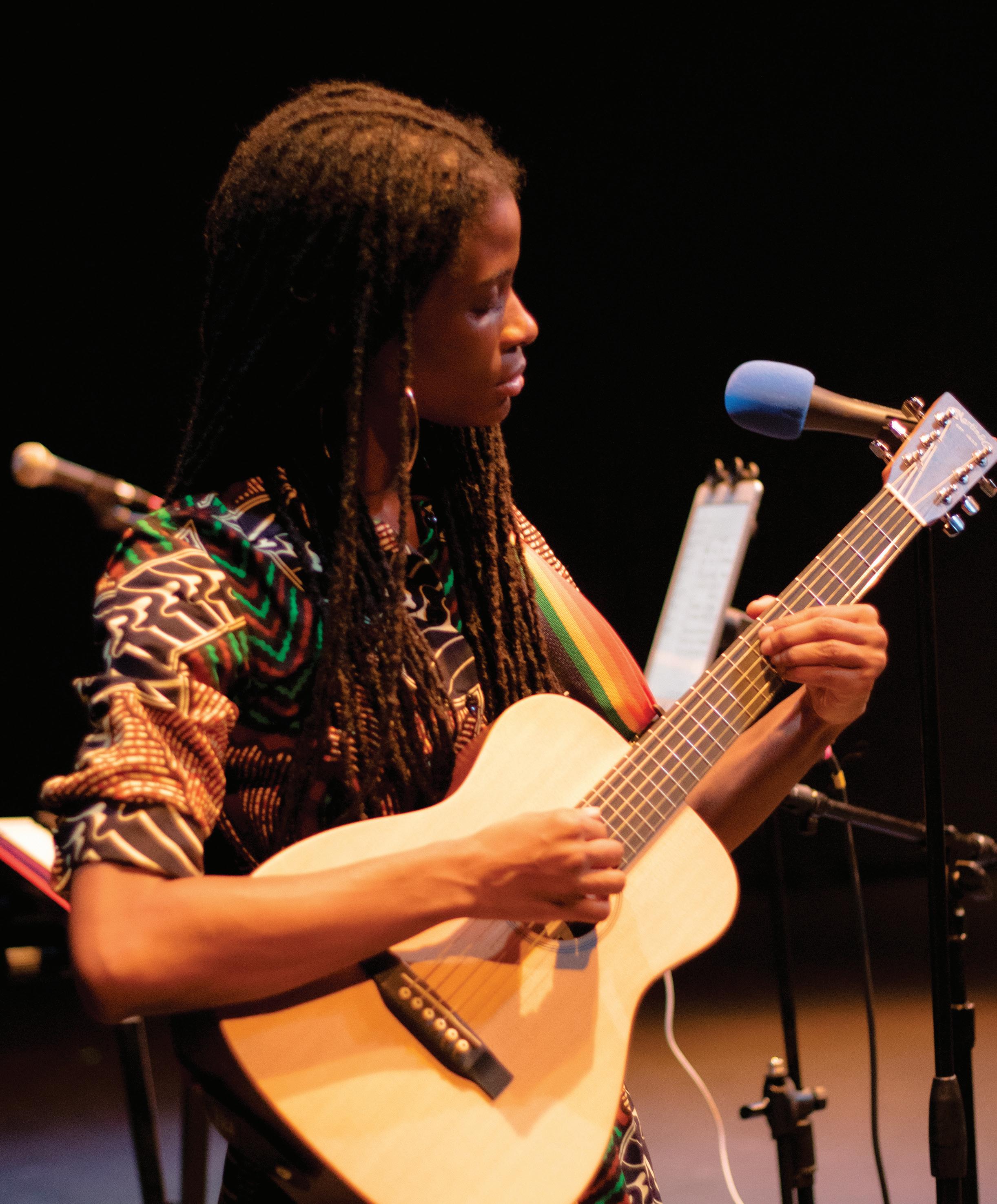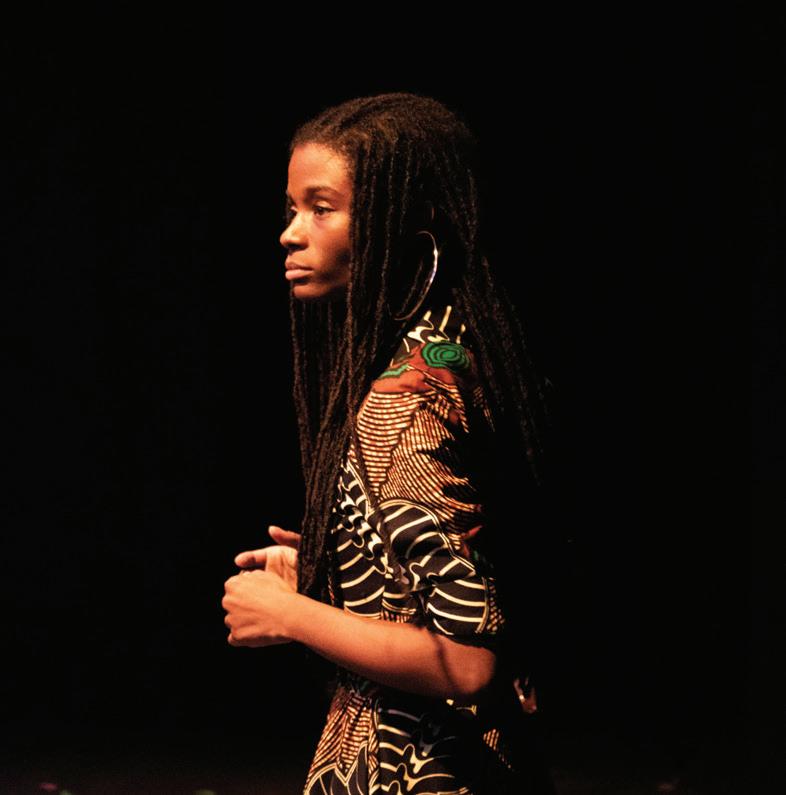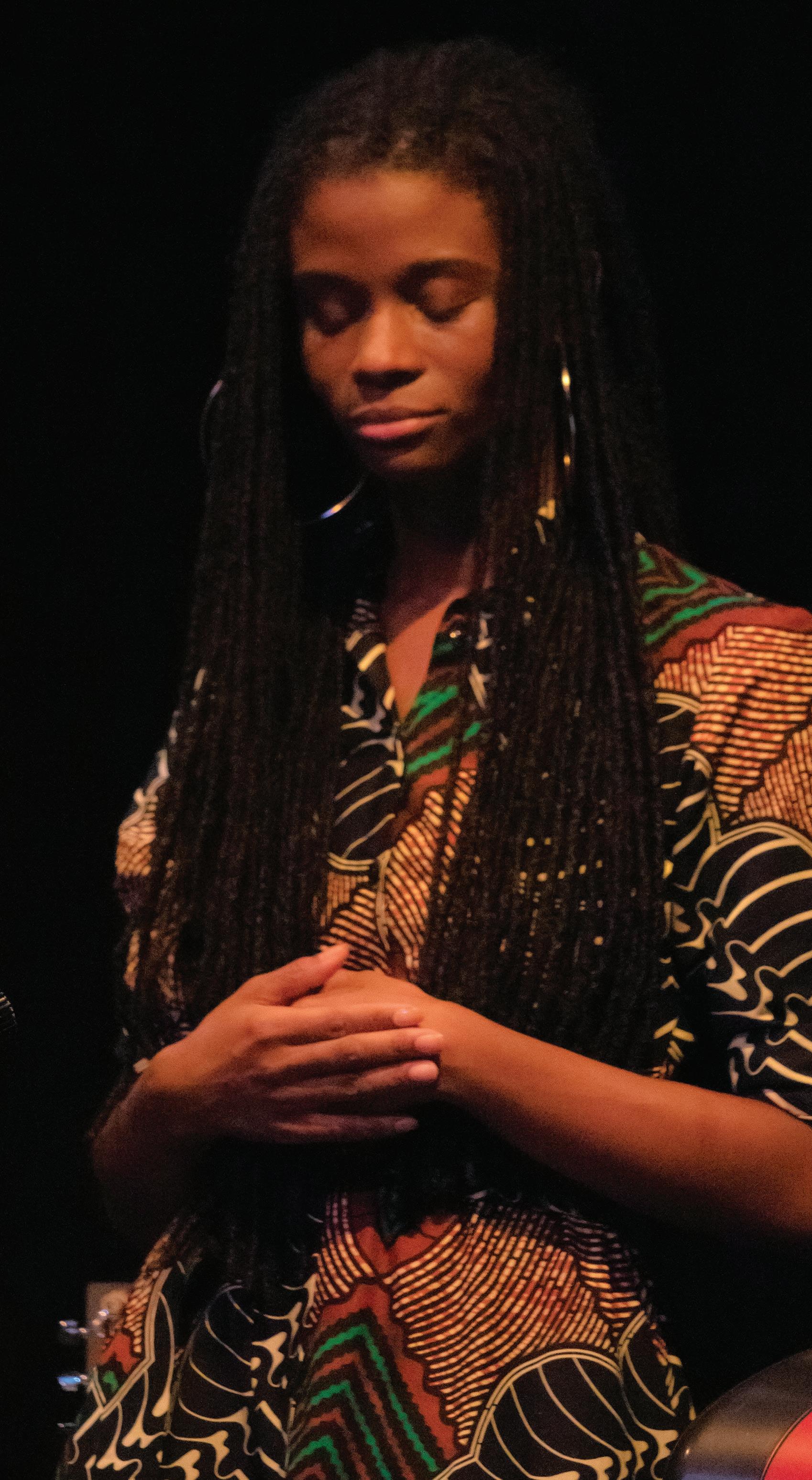
5 minute read
SINGER
from OTK Issue 02
by One To Know
By Jocelyn Tatum Photos by Eric Ramirez
Advertisement
She looks up and out over the
fretboard of her LX1 Little Martin
guitar or Pisgah banjo toward the sky
when she sings. She has several banjos and guitars, but these are her current favorites. Her face softens as she eases into the song. A subtle smile cracks her lips and her voice harkens back to the enchanting sirens from the “Oh Brother, Where Art Thou?” movie, a folk parody of the Greek classic The Odyssey. Her sound, style and talent are unlike any other in Fort Worth, especially for the already underrepresented Black female musicians here.
“I just get in where I fit in,” Brandi Pace says. What she writes runs the gamut, but what she performs and practices mostly these days she describes as Early American Roots music, the parent to the blues if she were to describe it to one of her former elementary school students.
She didn’t get into roots music until her early 30s, and she has been around music her whole life. She grew up in Atlanta, Georgia, and has generational roots there. She remembers when she was little a few family members who were church musicians and would form a band and choir preforming gospel music at family gatherings.
“Once I learned more about the history and the style and started connecting with other Black folks who were really digging deep into the roots of the music, it became a really strong cultural connection for me. So that’s really been the most powerful part of making this music,” she says.
In a recent picture posted on her Instagram of her and several other women all holding banjos in Augusta, Georgia, for the “Old-Time and Blues and Swing Week,” she said that 10 years ago, seeing that many Black roots musicians all in one place would have been rare. “We are at a wonderful moment in American history in which a growing number of Black roots musicians are reclaiming our musical traditions — the banjo was created by enslaved Africans in the Americas, and Blackness is deeply embedded within the origin of traditional American music.”

Brandi is a musician, educator, racial equity advocate, PhD student in music education, and 37-year-old mother of three grade school children. She sings and plays the piano, the guitar, ukulele and banjo, and those are just what she feels confident enough to perform in front of an audience. She also launched the Fort Worth African American Roots Music Festival (FWAAMFest) in 2019, but the pandemic sent it to the virtual world like everything else. It will now be in person March 19, 2022, at Southside Preservation Hall in the Near Southside District. People can still watch the virtual show by looking the festival up on YouTube or Facebook. “I am so excited that we are set to bring Fort Worth an inperson festival in 2022,” she says.
Music is a language everyone speaks, and Brandi brings awareness to underrepresented racial groups through those universal notes and her nonprofit, Decolonizing the Music Room. There is a dominant narrative in music education in America, and as a Black woman and educator, she knows how music should be represented in the classroom. Her nonprofit is a platform to rethink the way people engage with music education and get information out there about a more diverse music narrative. She offers training and consulting sessions, so she does a fair amount of presenting to nonprofits and school districts to hopefully create lasting change.
Music has always been there for her and has expanded as a conduit for all things spiritual, emotional and even practical, like a source of income. But making a living in music is not a motivator; it is just a part of her. “I think it is more a communication of identity. It is being able
SCAN THE SPOTIFY CODE to LISTEN to Brandi’s 5 favorite tracks of all time.

What Brandi is listening to these days.
Her tastes vary wildly, but these days she has been listening to a lot of songs from Esperanza Spalding, Moonchild, Fastball, Fiona Apple, Djavan, Bilal, and tons of Naruto opening and ending themes.
Here is a list of five of some of her favorite tracks of all time. “It’s so hard to choose only five,” she says.
AGUAS DE MARCO by Rosa Passos
I LIKE IT by DeBarge
WAVE GOODBYE by Chris Cornell
THREE VIEWS OF A SECRET plural views by Jaco Pastorius
SAY YOU’LL BE THERE by Spice Girls
to express who I am, and who I am is so many things, that being able to have different styles and different instruments,” she says.
It is important for her that she expresses her full identity as a Black woman and as a mother, educator and activist. “More specific to my identity as a Black woman [...] we don’t get heard or seen in the fullness of our identity very often in a general sense. It is really important to create space to do that. When we create space, other people see space that they, too, can take up, and they feel like they are freer to speak out when they see other people actually doing that thing [...] It really helps draw others out who might share the same marginalization or sexualization or racial issues,” she says.
Keep singing, Brandi, because we look forward to seeing you spend more time in the spotlight as you create space for women all over Fort Worth and beyond with your angelic voice.
Tell us about your banjo collection:

Brandi has several banjos. “You can’t have just one, LOL).” She has a gourd, one from about 1890, one from about 1910, what she would call a basic but good quality electric acoustic, but her favorite is her Pisgah banjo. “My friend had it built customized to her liking a few years ago. We were together at a big old old-time festival in West Virginia in 2019, and she let me play it for a couple of days. I loved it so much I asked if she would sell it to me, and she did.” Once I learned more about the history and the style and started connecting with other Black folks who were really digging deep into the roots of the music, it became a really strong cultural connection for me. So that’s 11 really been the most powerful part of making this music.” -BRANDI PACE OneToKnowMagazine.com | ISSUE 02









